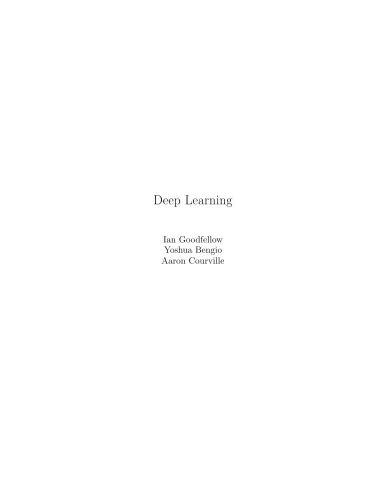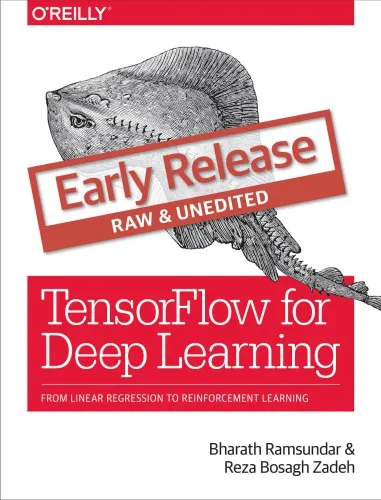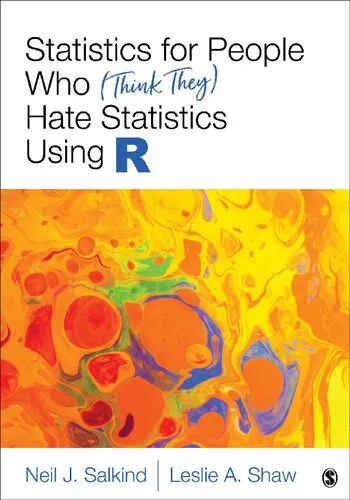Group Recommender Systems. An Introduction
4.5
بر اساس نظر کاربران

شما میتونید سوالاتتون در باره کتاب رو از هوش مصنوعیش بعد از ورود بپرسید
هر دانلود یا پرسش از هوش مصنوعی 2 امتیاز لازم دارد، برای بدست آوردن امتیاز رایگان، به صفحه ی راهنمای امتیازات سر بزنید و یک سری کار ارزشمند انجام بدینکتاب های مرتبط:
معرفی کتاب "Group Recommender Systems. An Introduction"
کتاب "Group Recommender Systems. An Introduction" نوشته الکساندر فلفرنیگ و همکاران، یکی از مهمترین منابع در حوزه سیستمهای پیشنهاددهنده گروهی است. این کتاب بهطور جامع به معرفی مفاهیم، مدلها، چالشها و راهحلهای مرتبط با سیستمهای پیشنهاددهنده برای گروهها میپردازد و برای متخصصان، پژوهشگران، و دانشجویان حوزه تکنولوژی اطلاعات و توصیهگرها بسیار ارزشمند است.
خلاصهای جامع از محتوای کتاب
سیستمهای پیشنهاددهنده یکی از مهمترین دستاوردهای تکنولوژیک در دهههای اخیر هستند که با تحلیل دادههای کاربران، پیشنهادات شخصیسازیشدهای ارائه میدهند. اما در مواردی مانند تصمیمگیریهای گروهی، نیاز به رویکردهای متفاوت وجود دارد. این کتاب به نحوی عمیق به بررسی ساختار سیستمهای Group Recommender Systems میپردازد و توضیح میدهد که چگونه این روشها تلاش میکنند تا نیازها و سلایق تمام اعضای یک گروه را متعادل کنند.
در این کتاب به مباحث کلیدی مانند "چگونگی جمعآوری بازخورد کاربران"، "مدلسازی اولویتهای گروهی"، "مدیریت تضادها در گروه" و "استفاده از الگوریتمهای Machine Learning" بهصورت دقیق پرداخته شده است. همچنین، مباحث عملی همچون طراحی و ارزیابی سیستمهای واقعی نیز پوشش داده میشود که درک کاربردی از این فناوری را فراهم میکند.
نکاتی کلیدی
- استفاده از تکنیکهای aggregation strategies برای جمعبندی اولویتهای گروه
- تشریح چالشهای عملی مانند حل تعارضات در پیشنهاددهی گروهی
- ارائه استراتژیهای طراحی سیستمهای پیشنهادی با استفاده از دادههای واقعی
- بررسی کاربرد سیستمهای پیشنهادی گروهی در حوزههایی مانند سفر، سرگرمی و تجارت آنلاین
جملات مشهور از کتاب
“Group recommender systems aim to provide personalized recommendations to a collection of users, balancing individual preferences while ensuring overall group satisfaction.”
“The main challenge of group recommendations is addressing the trade-off between individual preferences and collective satisfaction.”
چرا این کتاب مهم است؟
با گسترش استفاده از سیستمهای پیشنهاددهنده در زندگی روزمره، نیاز به توسعه روشهایی که بتوانند در زمینه تصمیمگیریهای گروهی کمک کنند، افزایش یافته است. این کتاب اولین قدم جامع در جهت ارائه یک راهنمای مناسب برای درک سیستمهای پیشنهاددهنده گروهی است. از آنجایی که این حوزه نه تنها مباحث فنی بلکه مسائل شناختی و روانشناختی را در بر میگیرد، کتاب "Group Recommender Systems. An Introduction" با ارائه تحقیقات تکمیلی و راهکارهای مفید، به یکی از منابع کلیدی برای یادگیری این موضوع تبدیل شده است. چه بهعنوان یک محقق و چه بهعنوان یک مهندس نرمافزار عملیاتی، این کتاب دریچهای نوین به دنیای توصیهگرهای گروهی باز میکند.
در نهایت، این کتاب ترکیبی از نظریه و عمل را با محتوایی غنی ارائه میدهد که میتواند الهامبخش نوآوریهای بزرگ در زمینه هوش مصنوعی و طراحی سیستمهای کاربردی باشد. اگر به دنبال فهم سیستمهای پیشنهاددهنده فراتر از سطح فردی و ورود به دنیای تصمیمگیریهای گروهی هستید، این کتاب بهترین نقطه شروع است.
Introduction to "Group Recommender Systems: An Introduction"
"Group Recommender Systems: An Introduction" by Alexander Felfernig et al. is an essential resource for understanding the rapidly growing field of group recommender systems. As technology evolves and collective decision-making becomes a cornerstone of countless domains—ranging from entertainment to business planning—this book bridges the gap between theory and application, equipping readers with the knowledge to develop, evaluate, and refine group recommendation algorithms. Whether you're a researcher, developer, or practitioner, this book brings clarity to the intricacies of designing systems that cater to the preferences of multiple users simultaneously.
Detailed Summary
This book delves deep into the mechanics and principles behind group recommender systems. Unlike traditional recommendation systems designed for individual users, group recommenders are tailored to handle the dynamics, conflicts, and diversity of shared decision-making. The book begins with an introduction to recommendation systems and explores the unique challenges and advantages of adapting these systems for groups. Through logical progression, the authors explain the core concepts, including preference aggregation, conflict resolution, and the technical frameworks required to develop robust group recommenders.
Later chapters illuminate various application areas for group recommendation systems, from recommending movies for friends to planning family vacations or collaborative productivity tools for the workplace. The book also highlights real-world implementation issues, such as handling incomplete or conflicting data, improving fairness, and ensuring user satisfaction across diverse stakeholder groups.
A strong emphasis is placed on empirical validation, with detailed explanations of evaluation metrics and experimental methodologies used to analyze group recommender systems. By blending academic rigor with practical insight, the authors ensure that readers are equipped not only with theoretical understanding but also with actionable strategies for system development and enhancement.
Key Takeaways
- Comprehensive overview of group recommender systems, covering both foundational concepts and advanced topics.
- Insight into the psychology of group decision-making and how it influences design choices.
- Strategies for preference aggregation and conflict resolution in group recommender scenarios.
- Detailed examination of the challenges of fairness, transparency, and trust in group recommendations.
- Practical guidelines for implementing and evaluating group recommender systems in real-world settings.
Famous Quotes from the Book
"Addressing the needs of a group rather than an individual shifts the paradigm of recommendation systems design, requiring new approaches to modeling preferences and resolving conflicts."
"The success of a group recommender system lies not just in finding common ground but in creating satisfaction for all members involved."
"Adaptation and personalization are as vital for groups as they are for individuals—what differs is the complexity of accommodating shared preferences."
Why This Book Matters
Group recommender systems are becoming increasingly relevant in our interconnected world. From streaming platforms curating shows that satisfy multiple viewers to collaborative tools enhancing productivity in professional environments, the need for effective group-based decision-making cannot be overstated. This book is a cornerstone for anyone looking to navigate this emerging field, offering solid grounding in theoretical concepts while addressing real-world challenges practitioners face.
By focusing on the diversity of group needs and the underlying processes of interaction and satisfaction, the authors highlight the importance of human-centric design in artificial intelligence systems. The frameworks and methodologies presented in this book can be adapted to various applications, equipping readers with practical knowledge that extends beyond the scope of recommendation systems into other fields where group dynamics are critical.
"Group Recommender Systems: An Introduction" is not just a technical manual—it is a comprehensive guide to understanding how technology can bring people together by aligning diverse preferences and enabling consensus. It serves as a beacon for researchers, developers, and decision-makers aiming to grasp the potential of group recommendations in the modern digital landscape.
دانلود رایگان مستقیم
شما میتونید سوالاتتون در باره کتاب رو از هوش مصنوعیش بعد از ورود بپرسید
دسترسی به کتابها از طریق پلتفرمهای قانونی و کتابخانههای عمومی نه تنها از حقوق نویسندگان و ناشران حمایت میکند، بلکه به پایداری فرهنگ کتابخوانی نیز کمک میرساند. پیش از دانلود، لحظهای به بررسی این گزینهها فکر کنید.
این کتاب رو در پلتفرم های دیگه ببینید
WorldCat به شما کمک میکنه تا کتاب ها رو در کتابخانه های سراسر دنیا پیدا کنید
امتیازها، نظرات تخصصی و صحبت ها درباره کتاب را در Goodreads ببینید
کتابهای کمیاب یا دست دوم را در AbeBooks پیدا کنید و بخرید
1464
بازدید4.5
امتیاز0
نظر98%
رضایتنظرات:
4.5
بر اساس 0 نظر کاربران
Questions & Answers
Ask questions about this book or help others by answering
No questions yet. Be the first to ask!















